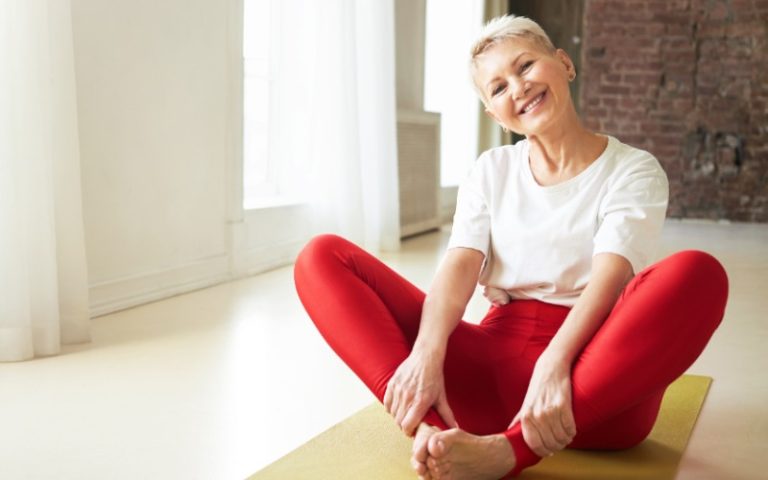Each phase of life brings new challenges to face and address. For women, menopause is one of these major stages. This transition can introduce changes that affect our physical body, emotional state, and even impact our sexual health. With the right tools and support, including regular exercise and mindful nutrition, menopause can become a period of empowerment, strengthened self-care, and discovery of its surprising gifts.
Menopause & Exercise
Regular exercise helps to relieve stress, enhancing our overall quality of life (1). The menopausal phase can be overwhelming, with fluctuating hormones and lifestyle adaptations. Turning to exercise as a stress-buster can act as an anchor during this period. Recognizing, too, that you are not alone in this journey can provide a sense of comfort and relief. Taking a group exercise class and seeing other women in your age bracket exercising can lend a sense of support and solidarity.
“Exercise is important at every stage of life, and it becomes even more crucial during menopause,” explains Beth Whitney, Co-Owner of Fitness Unlimited. “It’s a great time to try new things. Introducing yoga and adding gentle stretching can help with anxiety because they help calm your parasympathetic nervous system. Even doing box breathing, where you breathe in on a count of four, and out on a count of four, four to five times, can be really soothing and help you feel better.
The tendency to experience weight gain and loss of muscle mass, two common symptoms of menopause, are not caused by a slowing metabolism, a widely held misconception. Women’s metabolic rates are fairly steady between the ages of 20 and 60. (2) A combination of fluctuating hormones, including a decrease in estrogen levels that impact hormones that regulate appetite, can make a woman in menopause feel hungrier. This hormonal difference can also increase cravings for sweet and/or savory foods. Sleep cycles may also be disrupted, impacting overall health. While the number on the scale may remain the same, women’s body composition and fat distribution also changes, which can mean a difference in appearance. (3) The good news is that as your body changes, you have an opportunity to adapt the way you approach your fitness goals, by introducing new elements that you may not have tried before.
A STRONGER, WISER YOU
While no one is going to jump for joy when having a hot flash, there are some gifts to recognize about menopause. If you’ve had children, they’re probably grown-up (or close to it), leaving you more time for yourself. You’re at a stage of your life where you’ve gained a lot of wisdom, and with that comes self-confidence about your personal strengths and abilities. And you’re much more likely to be a strong advocate for yourself, in ways that you may have hesitated about when you were younger.
Regular workouts are an effective ways to target these developments during menopause. Engaging in strength training, fun cardio-based classes, yoga, pilates or a brisk walk under the sun can contribute to a stronger, fitter version of ourselves. And, exercise does not have to be rigorous to have a positive impact. Consistency is key to decreasing inflammation at the cellular level, increasing strength and flexibility, as well as reducing stress. (4)
“We offer over 75 classes per week, throughout the day, so there is something for everyone, whether it’s strength training with cardio, yoga, pilates, or barre,” says Co-Owner, Cindy McCarthy. “We have high intensity and low intensity interval training classes. And instructors go out of their way to make everyone in class feel empowered and supported, wherever they are on their fitness journey.” Personal or small group training is also an option.
Access Fitness Unlimited’s class schedule here.
Menopause, Nutrition & Alcohol Consumption
Alongside physical fitness, nutrition plays a pivotal role. (5) During menopause, women experience a loss of lean body mass and bone density. Less than ideal eating habits that we had prior to menopause (think greasy fast food and sugar-laden snacks, as well as alcoholic beverages) may exacerbate unpleasant symptoms such as hot flashes, brain fog, and indigestion. It is also important to emphasize that not all women experience menopause in the same exact way. Think of menopause as being on a spectrum or scale; you may have some symptoms that manifest more intensely, and some may not be part of your experience at all.
Whatever the case, embracing a nutrient-rich diet, brimming with vegetables, lean proteins, healthy fats and whole grains, and limiting or eliminating processed foods can contribute to hormone balance, bone health, and improved energy levels. (One tip: when looking at cured meats, check for nitrate/nitrite free options). What we consume ultimately fuels our workout performance and overall health. And while occasionally indulging in a delicious treat is fun, especially at festive times of year, extra care should be taken when it comes to drinking beer, wine and spirits.
COCKTAIL TIME TIPS
While it’s true that most women will notice a difference in how alcohol effects them as they enter the perimenopause and menopausal stages, it does not mean that you can’t still enjoy your favorite adult beverages. Be aware that you may experience the same level of relaxation with much less alcohol involved. And drinking a glass of water in-between cocktails can help with dehydration.
Women process alcohol differently from men; in general, female bodies are composed of 45% – 50% water, as opposed to males at 55%-65%. This means that women’s bodies have less blood to dilute the effects of alcohol on their systems. It takes a woman’s body longer to metabolize the same amount of alcohol as a man. Women are more likely than men to develop high blood pressure, liver issues, cognitive decline and other health complications from consuming alcohol. (6) You can learn more about alcohol consumption and women’s health here. Pivoting to healthier habits can be easier when you have outside support.
“Our LBD program (Living Better Daily) which we run several times a year, is more than a nutrition program – it’s a shift in lifestyle that helps you make the best decisions based on your wellness goals for yourself, in a manageable way,” says Beth. (You can learn more about Fitness Unlimited’s nutrition programs here.)
Menopause & Sexual Health
Women’s sexual health during menopause is now becoming more widely discussed. More than a third of women in perimenopause, or who are postmenopausal, report having sexual difficulties (7). These can range from decreased libido or trouble in achieving orgasm. Vaginal thinning and dryness can make intimacy physically painful. (8)
Though it can be a sensitive subject, communication with your partner becomes key in establishing realistic sexual expectations and achieving intimate connections as we age. It’s important for your partner to know how being in the midst of, or post-menopausal, is making you feel, physically as well as emotionally. For example, you may need more time and more (or different) stimulation to feel aroused and comfortable. You may not be super excited about the changes that are taking place in your physique, and that can impact your feelings about having sex.
You should also talk to your doctor! There are many treatments and therapies that can alleviate the symptoms of menopause, including vaginal discomfort. (9) These include vaginal creams and other topical ointments. You can find more information about women’s sexual health during menopause here.
Exercise and nutrition are significant allies throughout life, but particularly during (and post) menopause. Regular physical activity can boost mood and body image, while the nutrients from a whole-food diet support hormonal health, energy, and vitality.
Navigating the menopausal stage can be challenging, presenting both physical and emotional changes. But menopause is not a crisis; it is a natural transition that increases your emotional resilience and understanding of what you’re capable of accomplishing in many arenas in life. View this stage as an opportunity to reinvent your lifestyle holisticallyy, and be sure you get the support you need.
Authored by Melissa E. Daley, CMO, ChitChatDigital LLC (https://www.chitchat.digital)
Sources
- Pontzer H, Yamada Y, Sagayama H, Ainslie PN, Andersen LF, Anderson LJ, et al. Daily en- ergy expenditure through the human life course. Science. 2021 Aug 13;373(6556):808–12.






